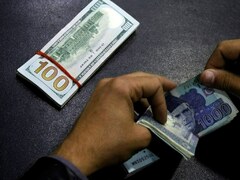The dollar hit three-month highs against the yen and edged up against the euro ahead of key US trade data on Thursday, with markets also wary of escalating tension over North Korea's nuclear ambitions. Economists are expecting the US trade deficit to have narrowed in December from November's record levels, particularly after US Federal Reserve Chairman Alan Greenspan made upbeat comments last week on the US current account deficit.
North Korea said on Thursday it has built nuclear weapons for self-defence and was suspending participation in six-party talks on its nuclear programmes. US Secretary of State Condoleezza Rice said late in the European morning there was no security assurance for North Korea if it did not dismantle its nuclear programme.
"There are some positioning moves ahead of the trade figures," said Kamal Sharma, currency strategist at Dresdner Kleinwort Wasserstein.
"We had the North Korea news but that came out earlier this morning," he added.
The dollar rose as far as 106.36 yen by 1248 GMT, up nearly 0.66 percent on the day, its strongest showing since mid-November.
The yen is seen susceptible to geopolitical tensions in neighbouring North Korea.
The dollar strengthened slightly against the euro to $1.2777, half a cent below three-month highs set this week.
The dollar has rallied in recent weeks as the market has reacted to signs of US economic recovery and the prospect of further domestic rate rises rather than the need to attract flows into the United States through a weakening currency.
US trade figures for December at 1330 GMT are expected to show a deficit of $57 billion. That would be narrower than the record $60.30 billion posted in November, which is also expected to be revised downward.
"Some people are arguing that any improvement in the trade data is already priced into the dollar after Greenspan's comments last week," said Daragh Maher, currency strategist at Calyon.
"The focus for the dollar has shifted to some of the cyclical factors like interest rate differentials and relative growth rates and structural factors are no longer dominant."
US Federal Reserve Chairman Alan Greenspan gave the dollar a lift on Friday, saying market pressures appeared poised to stabilise and possibly cut the US current account deficit over the longer term.
Weekly US jobless claims are also due at 1330 GMT.
Sterling was steady against the dollar and euro after the Bank of England left interest rates unchanged at 4.75 percent, as widely expected.
The European Central Bank said in its monthly bulletin there was no build-up in underlying inflationary pressures in the eurozone and that economic growth had yet to pick up.
BR100
15,103
Increased By
140.9 (0.94%)
BR30
42,619
Increased By
540.8 (1.29%)
KSE100
148,196
Increased By
1704.8 (1.16%)
KSE30
45,271
Increased By
438.2 (0.98%)






















Comments
Comments are closed.